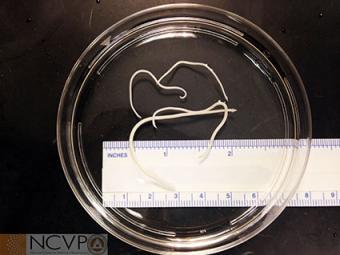
Recognizing the signs of worms in cats can help you tell whether your kitty has a problem with parasites. Once you know which type of worm you're dealing with, you can get your cat treated right away.
Worms: Your Cat's Enemy
Cat worms are intestinal parasites that can be found living in your pet's digestive tract. They attach themselves to the lining of the stomach and small intestines and rob your pet of vital nutrition.
According to the Cornell University College of Veterinary Medicine the main types of worms that infect cats include:
- Tapeworms - These worms are rather flat in appearance and can range in size from less than an inch up to about two and a half yards.

- Roundworms - These intestinal parasites resemble a piece of spaghetti and are the most common type of worms found in pets.

- Hookworms - These worms are named for the hook-like teeth they use to attach themselves to your cat's intestinal walls. These parasites feed on blood, causing diarrhea and anemia.

Common Signs of Worm Infestation
According to Doctors Foster and Smith, signs that your cat has worms vary, but they can include:
- Diarrhea and/or vomiting (Often containing worms or worm segments)
- Dehydration
- Pale gums
- Pot-bellied appearance
- Weight loss
- Lethargy
- Constipation
- Black/tarry stools
- Dull, rough-looking coat
See Symptoms of Cat Worms for more information on recognizing the signs of specific types of worm infestation.
Diagnosis

If a worm infestation is allowed to continue unchecked, an affected cat's immune system becomes compromised. This makes it difficult to fight off other illnesses, and the animal's health quickly declines. Diagnosing a case of worms requires examination of a fresh stool sample from your pet. Your veterinarian will use a centrifuge to separate worm particles from the stool, and then identify the type of worms present, if any, with the use of a microscope.
Treatment

Once the type of worm is identified, your cat will be given deworming medicine developed to be effective for that particular type of worm or worms. Cats may carry more than one type of worm at the same time, so a proper diagnosis is essential for ridding your pet of these parasites.
According to Doctors Foster and Smith, the following medications are used to treat worms in cats.
- Drontal - Treats roundworms, tapeworms and hookworms (Prescription required)
- Profender - Treats roundworms, tapeworms and hookworms
- Interceptor - Treats roundworms and hookworms
- Revolution - Treats roundworms and hookworms
It should be noted that if you have multiple cats, they will all likely be infected with these parasites at the same time, especially if they are using the same litter box. Therefore, it's necessary to provide a stool sample from each cat, and simultaneously treat everyone for any infestation present.
How Cats Get Worms
Cats and kittens may contract worms in several ways.
- Ingestion of soil and plant material contaminated with worm ova
- Exposure to feces containing worm ova
- Ingesting fleas that harbor worm ova
- Nursing from a contaminated mother
- Eating contaminated prey such as mice and birds
Prevention
Worm infestations are extremely common and difficult to prevent, but there are some measures you can take to cut down on your pet's possibility of worm exposure.
- Limit your cat's outside exposure to soil and plants.
- Do not allow your cat to eat or play with birds and mice.
- Keep your cat from associating with neighborhood strays who may already be infested.
- Keep your cat well-groomed, which will reduce the risk of a flea infestation.
It may also interest and alarm you to know that it is possible for humans to ingest worm ova shed by their cats, although the parasites are unable to complete their life cycle within their human hosts. This is one good reason to keep Kitty off your tables and counter tops!
Serious Health Threat
Worms are more than just mere pests. They can have a grave effect on your pet's health. To keep your cat as safe as possible, be sure to take your pet to your vet for an annual examination, and provide a fecal sample every six months. This routine health care can make all the difference in your cat's quality of life.
.







